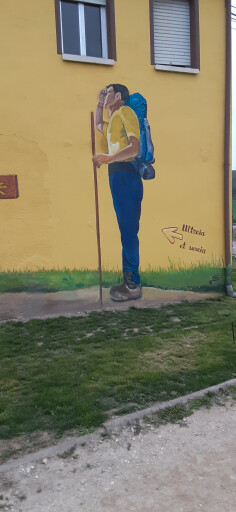Camino 6: Coming Back
The end of this journey, as I write, is three or four days ahead: the cathedral of Santiago, wherein are venerated the remains of Saint James, brother of John and disciple of Jesus. The walking has gone on for more than a month. It will shortly come to an end.
One seeks appropriate analogies. There was the last week before marriage, back in the previous century. I worked three days, took off Thursday and Friday, married Susan on Friday evening. The anticipation and preparation had gone on all summer, a long time of waiting and arranging, and now the day was close. The waiting would soon be over.
Others have waited for death to come, knowing that the time is short even though they know neither the day nor the hour. Waiting will soon be over.
But what comes after the waiting? It is at once both ordinary and changed. After a wedding, an ordinary married life sets in as one gets used to being married and learns how to go about, well, ordinary life. After a death, a different sort of ordinary life sets in, a life with a hole in it. Nonetheless, soon this becomes ordinary also.
The last part of the Camino de Santiago differs from the earlier six or seven hundred kilometers. In order to receive a Compostela, one must walk at least 100 km. So, naturally, the last hundred kilometers have a much greater number of pilgrims. At the same time, here is where other traditional caminos join the Camino Francese. I met yesterday a couple that had walked the Camino del Norte, which is much more rugged and runs along the northern edge of Spain. Other pilgrims have joined us from the Camino Primativo and the Via de la Plata.
With more walkers, the Camino feels more like ordinary life, less isolated. There are hugely more pilgrims in the villages we go through and eat and sleep in. There is more commerce and we must make more choices. We have to deal with more people—and please spare a thought for those who have to deal with us! I have noticed more fencing, more signs reminding pilgrims not to stray through the properties they are walking past.
Which is to say, in many ways these final days of the Camino have been reintroducing me to ordinary life, the bustle, the rampant human self-centeredness, the competition for getting the best room and finding the best dinner. I cannot say I have enjoyed this. Nor am I happy with my personal gut reactions to it.
On the other hand, there is still Saint James, up ahead. A few weeks ago an Irish Catholic asked me: why James? Why am I walking on pilgrimage to his mortal remains? The best I have come up with is this: James was one of those that Jesus chose, one of those who were with him as disciples. To go to James is to get just one step removed from Jesus.
That is not much of an answer, but there are still a few days to try to integrate the return of the ordinary with what is bound to be extraordinarily mysterious.


